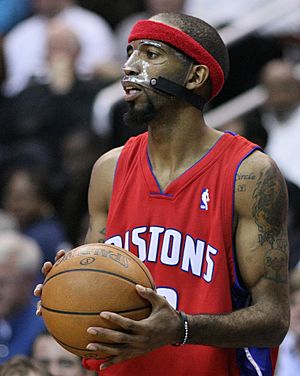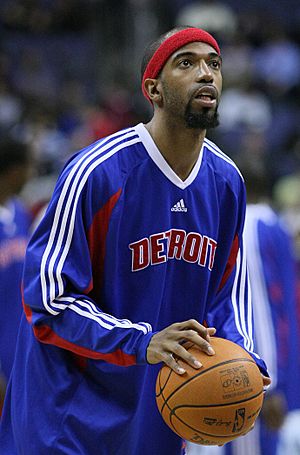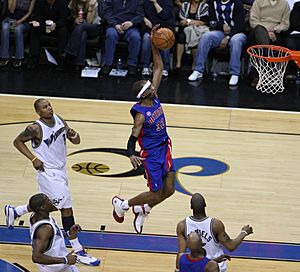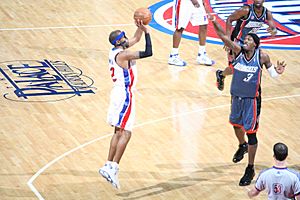Richard Hamilton (basketball) facts for kids
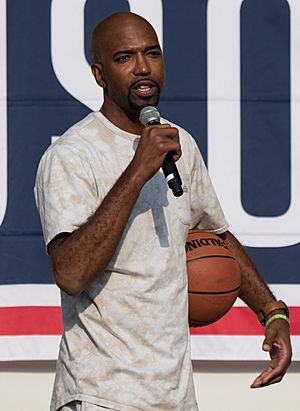
Hamilton speaking at a USO event in 2018
|
||||||||||||||
| Personal information | ||||||||||||||
|---|---|---|---|---|---|---|---|---|---|---|---|---|---|---|
| Born | February 14, 1978 Coatesville, Pennsylvania, U.S. |
|||||||||||||
| High school | Coatesville Area (Coatesville, Pennsylvania) |
|||||||||||||
| Listed height | 6 ft 7 in (2.01 m) | |||||||||||||
| Listed weight | 193 lb (88 kg) | |||||||||||||
| Career information | ||||||||||||||
| College | UConn (1996–1999) | |||||||||||||
| NBA Draft | 1999 / Round: 1 / Pick: 7th overall | |||||||||||||
| Selected by the Washington Wizards | ||||||||||||||
| Pro career | 1999–2013 | |||||||||||||
| Career history | ||||||||||||||
| 1999–2002 | Washington Wizards | |||||||||||||
| 2002–2011 | Detroit Pistons | |||||||||||||
| 2011–2013 | Chicago Bulls | |||||||||||||
| Career highlights and awards | ||||||||||||||
|
||||||||||||||
| Career statistics | ||||||||||||||
| Points | 15,708 (17.1 ppg) | |||||||||||||
| Rebounds | 2,852 (3.2 rpg) | |||||||||||||
| Assists | 3,125 (3.4 apg) | |||||||||||||
|
Medals
|
||||||||||||||
Richard Clay "Rip" Hamilton (born February 14, 1978) is an American former professional basketball player. He is also a basketball analyst for CBS Sports HQ. Hamilton played 14 seasons in the National Basketball Association (NBA). He is most famous for his nine years with the Detroit Pistons. During that time, he was chosen as an All-Star three times. He helped the Pistons reach the Eastern Conference Finals six times in a row. They also made it to the NBA Finals twice and won the 2004 NBA championship.
Richard was born and grew up in Coatesville, Pennsylvania. He played college basketball for three years with the UConn Huskies. In his final year, 1999, he was named the Final Four's Most Outstanding Player. This happened when UConn surprisingly won the NCAA Championship against the strong Duke Blue Devils. He is the second-highest scorer in UConn history.
After college, Hamilton was named a top All-American. He decided to join the NBA draft early. He was picked seventh overall by the Washington Wizards in the 1999 NBA draft. He played there for three seasons, even playing alongside basketball legend Michael Jordan. In 2002, he was traded to the Detroit Pistons. He played nine seasons with them before finishing his career with two seasons with the Chicago Bulls. The Pistons honored him by retiring his No. 32 jersey on February 26, 2017.
Contents
College Basketball Journey
Hamilton played college basketball at the University of Connecticut from 1996 to 1999. In 1998, during a "Sweet 16" game, he made a game-winning shot right as time ran out. This helped UConn win against the Washington Huskies.
In 1999, he was named the Most Outstanding Player of the NCAA tournament. This was after UConn won the national title. He scored 24.2 points per game during that tournament. UConn, ranked number 1, also beat the underdog team, the Gonzaga Bulldogs. Hamilton was a key player and the top scorer in that game.
In the final game, UConn beat a Duke team that was expected to win. Four Duke players from that team were later drafted into the NBA. Hamilton scored 27 points, grabbed 7 rebounds, and made 3 assists in that championship game.
Professional Basketball Career
Hamilton was chosen as the 7th pick in the 1999 NBA draft by the Washington Wizards. In his first game, he scored 10 points. In his first season, he played in 71 games and averaged 9 points. The Wizards did not make the playoffs that year.
The next year, Hamilton played more and doubled his scoring average to 18.1 points per game. In the off-season, Michael Jordan announced he would return to play for the Wizards. Hamilton then became the starting shooting guard. He and Jordan helped the team improve their record, but they still missed the playoffs. Hamilton averaged 20 points per game that season.
Playing for the Detroit Pistons (2002–2011)
In 2002, the Wizards traded Hamilton to the Detroit Pistons. The Pistons also added Chauncey Billups and drafted Tayshaun Prince. The team already had great players like Ben Wallace.
Hamilton started all 82 games for Detroit in his first season with them. He led the team in scoring with 19.7 points per game. The Pistons won 50 games and their division. In the playoffs, Hamilton helped the team come back from a 3-1 deficit to win their first series. They reached the Conference Finals but lost to the New Jersey Nets. Hamilton led Detroit in scoring throughout the playoffs.
Winning a Championship and More Finals Appearances: 2004–2005
During the 2003–04 season, Hamilton broke his nose twice. He started wearing a clear plastic face mask to protect it. This mask became his famous trademark. This season also saw the arrival of Rasheed Wallace. He joined Hamilton, Billups, Ben Wallace, and Prince to form the "Goin' to Work" Pistons.
Hamilton led the Pistons in scoring for the second year in a row, averaging 17.6 points per game. The Pistons finished the season with 54 wins. Hamilton scored a career-high 44 points in a game against the Cavaliers.
In the playoffs, the Pistons easily beat the Milwaukee Bucks. Then they had a tough seven-game series against the New Jersey Nets, winning after being down 3-2. Next, they faced the Indiana Pacers in the conference finals. The Pistons' strong defense and scoring were too much for the Pacers. Detroit won the series and reached the NBA Finals for the first time since 1990.
Many people thought the Pistons would lose in the Finals. They were playing against the famous Los Angeles Lakers team. But the Pistons surprised everyone by winning Game 1 in Los Angeles. The Lakers won Game 2, but the Pistons dominated the next three games in Detroit. They won the championship in five games! Hamilton led the Pistons in scoring during the Finals, averaging 21.4 points per game.
In the next season, Hamilton led the team in scoring again, averaging 18.7 points per game. On January 6, 2005, he became the only NBA player to lead his team in scoring in a game without making a single shot from the field. He scored all his points from free throws.
In the playoffs, Detroit beat Philadelphia. Then they had another rematch with Indiana. The Pistons won that series and advanced to the NBA Finals for the second year in a row. They faced the Miami Heat in the conference finals. The Pistons came back from being down 3-2 to win the series.
Detroit then played the San Antonio Spurs in the Finals. The Spurs won the first two games. The Pistons fought back and won two games, but the Spurs eventually won the series in Game 7. Hamilton averaged 20 points throughout the 2005 playoffs.
Three All-Star Selections: 2006–2008
The 2005–06 season was great for Hamilton. He averaged a career-high 20.1 points per game and was chosen for his first All-Star Game. He also led the league in three-point shooting percentage. The Pistons had their best season ever, winning 64 games. They easily won their first playoff series. Then they faced the Cleveland Cavaliers led by LeBron James. The Pistons won that series in seven games. This set up a rematch with Miami. The Pistons lost in six games, and Miami went on to win the NBA title.
During the 2006–07 season, Hamilton scored a career-high 51 points in a triple-overtime game against the New York Knicks. He averaged 19.8 points that season and was selected for the 2007 NBA All-Star Game again. The Pistons won 53 games and reached the conference finals. They faced the Cleveland Cavaliers again, but this time the Cavaliers won the series.
In the 2007–08 season, the Pistons won 59 games. Hamilton averaged 17.3 points per game and was chosen as an All-Star for the third year in a row. He also took part in the Three-Point Shootout contest.
The Pistons reached their sixth straight Eastern Conference Finals. However, they lost to the Boston Celtics in six games. After this loss, the team knew changes were coming.
Playing Without Billups: 2008–2011
Early in the 2008–09 season, the Pistons traded Hamilton's longtime teammate Chauncey Billups. Hamilton was disappointed but signed a new contract to stay with Detroit. He averaged 18.3 points per game that season. However, the team did not play well together and had their first losing record with Hamilton on the team. They still made the playoffs but were swept by Cleveland.
Hamilton played in 46 games in the 2009–10 season and averaged 18.1 points per game. The team won only 27 games. The next year, Hamilton had disagreements with his coach. This led to him playing very little for a period of time. In December 2011, the Pistons bought out his contract, making him a free agent.
Playing for the Chicago Bulls (2011–2013)
After leaving the Pistons, Hamilton signed a three-year contract with the Chicago Bulls. In the 2011–12 season, he averaged 11.6 points per game. He played only 28 games due to injuries. The Bulls finished with a great record, but their star player Derrick Rose got injured in the playoffs. The Bulls were then defeated in six games.
In the 2012–13 season, Hamilton averaged 9.8 points per game. He played 50 games. The Bulls made it to the second round of the playoffs but were eliminated by the Miami Heat. The Bulls decided not to keep Hamilton for the next season, and he became a free agent.
On February 26, 2015, Hamilton officially announced he was retiring from the NBA. This decision came after a foot injury in 2014.
On February 26, 2017, the Pistons honored Richard Hamilton by retiring his No. 32 jersey.
Media and Community Work
In the 2006–07 NBA season, Hamilton appeared in the NBA Fundamentals series. In this show, basketball players explain different parts of the game. Hamilton showed how to "move without the ball" to get away from defenders.
He also appeared on an episode of the game show Wanna Bet?.
Richard Hamilton has worked with many charities. He supported the Read to Achieve program and read books to children. He also appeared on an episode of Disney Channel's Imagination Movers. He helped the characters play basketball and learn about friendship.
Personal Life
Richard Hamilton has a son, Richard Clay Hamilton II, born in 2007. In 2009, Hamilton married T. J. Lottie. Many famous basketball players attended their wedding.
He got his nickname "Rip" from his father. His father was called "Rip" because as a baby, he would rip off his diaper!
Career Statistics
Here are some of Richard Hamilton's basketball statistics from his college and NBA careers.
College Statistics
| Legend | |||||
|---|---|---|---|---|---|
| GP | Games played | GS | Games started | MPG | Minutes per game |
| FG% | Field goal percentage | 3P% | 3-point field goal percentage | FT% | Free throw percentage |
| RPG | Rebounds per game | APG | Assists per game | SPG | Steals per game |
| BPG | Blocks per game | PPG | Points per game | Bold | Career high |
| Year | Team | GP | GS | MPG | FG% | 3P% | FT% | RPG | APG | SPG | BPG | PPG |
|---|---|---|---|---|---|---|---|---|---|---|---|---|
| 1996–97 | Connecticut | 32 | 32 | 30.6 | .386 | .376 | .784 | 4.3 | 2.8 | 1.3 | .3 | 15.9 |
| 1997–98 | Connecticut | 37 | 37 | 32.5 | .440 | .404 | .843 | 4.4 | 2.4 | 1.5 | .2 | 21.5 |
| 1998–99 | Connecticut | 34 | 34 | 32.1 | .443 | .347 | .833 | 4.8 | 2.7 | 1.2 | .3 | 21.5 |
| Career | 103 | 103 | 31.8 | .426 | .378 | .826 | 4.5 | 2.6 | 1.3 | .3 | 19.8 | |
NBA Statistics
Regular Season
| Year | Team | GP | GS | MPG | FG% | 3P% | FT% | RPG | APG | SPG | BPG | PPG |
|---|---|---|---|---|---|---|---|---|---|---|---|---|
| 1999–00 | Washington | 71 | 12 | 19.3 | .420 | .364 | .774 | 1.8 | 1.5 | .4 | .1 | 9.0 |
| 2000–01 | Washington | 78 | 42 | 32.3 | .438 | .274 | .868 | 3.1 | 2.9 | 1.0 | .1 | 18.1 |
| 2001–02 | Washington | 63 | 57 | 35.0 | .435 | .381 | .890 | 3.4 | 2.7 | .6 | .2 | 20.0 |
| 2002–03 | Detroit | 82 | 82* | 32.2 | .443 | .269 | .833 | 3.9 | 3.5 | .8 | .2 | 19.7 |
| 2003–04† | Detroit | 78 | 78 | 35.5 | .455 | .265 | .868 | 3.6 | 4.0 | 1.3 | .2 | 17.6 |
| 2004–05 | Detroit | 76 | 76 | 38.5 | .440 | .305 | .858 | 3.9 | 4.9 | 1.0 | .2 | 18.7 |
| 2005–06 | Detroit | 80 | 80 | 35.3 | .491 | .458* | .845 | 3.2 | 3.4 | .7 | .2 | 20.1 |
| 2006–07 | Detroit | 75 | 75 | 36.8 | .468 | .341 | .861 | 3.8 | 3.8 | .8 | .2 | 19.8 |
| 2007–08 | Detroit | 72 | 72 | 33.7 | .484 | .440 | .833 | 3.3 | 4.2 | 1.0 | .1 | 17.3 |
| 2008–09 | Detroit | 67 | 51 | 34.0 | .447 | .368 | .848 | 3.1 | 4.4 | .6 | .1 | 18.3 |
| 2009–10 | Detroit | 46 | 46 | 33.7 | .409 | .297 | .846 | 2.7 | 4.4 | .7 | .1 | 18.1 |
| 2010–11 | Detroit | 55 | 39 | 27.2 | .429 | .382 | .849 | 2.3 | 3.1 | .7 | .1 | 14.1 |
| 2011–12 | Chicago | 28 | 28 | 24.9 | .452 | .370 | .784 | 2.4 | 3.0 | .4 | .0 | 11.6 |
| 2012–13 | Chicago | 50 | 45 | 21.8 | .429 | .308 | .857 | 1.7 | 2.4 | .5 | .1 | 9.8 |
| Career | 921 | 783 | 32.1 | .449 | .346 | .852 | 3.1 | 3.4 | .8 | .1 | 17.1 | |
| All-Star | 3 | 0 | 15.3 | .458 | .500 | .000 | 2.0 | 1.3 | .0 | .0 | 7.7 | |
Playoffs
| Year | Team | GP | GS | MPG | FG% | 3P% | FT% | RPG | APG | SPG | BPG | PPG |
|---|---|---|---|---|---|---|---|---|---|---|---|---|
| 2003 | Detroit | 17 | 17 | 38.8 | .442 | .333 | .906 | 3.9 | 2.6 | .8 | .1 | 22.5 |
| 2004† | Detroit | 23 | 23 | 40.2 | .447 | .385 | .848 | 4.6 | 4.2 | 1.2 | .0 | 21.5 |
| 2005 | Detroit | 25 | 25 | 43.2 | .453 | .294 | .798 | 4.3 | 4.3 | .8 | .1 | 20.0 |
| 2006 | Detroit | 18 | 18 | 38.3 | .413 | .350 | .851 | 2.9 | 2.7 | .9 | .3 | 20.4 |
| 2007 | Detroit | 16 | 16 | 39.9 | .429 | .400 | .865 | 4.3 | 3.8 | .9 | .1 | 18.8 |
| 2008 | Detroit | 17 | 17 | 38.6 | .470 | .308 | .911 | 4.2 | 3.9 | 1.4 | .5 | 21.6 |
| 2009 | Detroit | 4 | 4 | 38.5 | .356 | .200 | .900 | 2.8 | 5.0 | 1.3 | .3 | 13.3 |
| 2012 | Chicago | 6 | 6 | 28.5 | .414 | .333 | .818 | 3.2 | 3.0 | .2 | .0 | 13.0 |
| 2013 | Chicago | 4 | 0 | 17.0 | .370 | .429 | .750 | .8 | 1.3 | .3 | .5 | 6.5 |
| Career | 130 | 126 | 38.8 | .439 | .340 | .860 | 3.9 | 3.6 | .9 | .2 | 19.8 | |
Awards and Honors
Richard Hamilton received many awards and honors during his basketball career:
- NBA
- NBA champion (2004)
- 3× NBA All-Star (2006, 2007, 2008)
- No. 32 jersey retired by Detroit Pistons
- Inducted into the Michigan Sports Hall of Fame in 2023
- College
- NCAA champion (1999)
- NCAA Final Four Most Outstanding Player (1999)
- Consensus first-team All-American (1999)
- Consensus second-team All-American (1998)
- 2× Big East Player of the Year (1998, 1999)
- 2× Big East All-Tournament Team (1998, 1999)
- 2× Big East leader in season points (1998, 1999)
- Big East All-Rookie Team (1997)
- Second-leading scorer in UConn history (2,036 points)
- Number 32 jersey retired by the University of Connecticut
See also
 In Spanish: Richard Hamilton (baloncestista) para niños
In Spanish: Richard Hamilton (baloncestista) para niños
- List of NBA franchise career scoring leaders
 | Jewel Prestage |
 | Ella Baker |
 | Fannie Lou Hamer |


